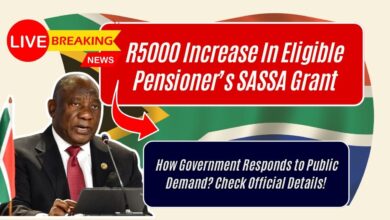Keir Starmer May Adjust DWP Benefits After Recent PIP Feedback — How it Can Impact Your Financials?
Keir Starmer May Adjust DWP Benefits After Recent PIP Feedback – The UK welfare system is gearing up for a major shake-up. With Keir Starmer’s government aiming to revamp Department for Work and Pensions (DWP) benefits, especially Personal Independence Payments (PIP), millions could see changes in their financial support. These adjustments come after fresh feedback and a political push to rein in welfare spending — but what does this mean for your wallet? Let’s break it down so you’re in the know.

Keir Starmer May Adjust DWP Benefits After Recent PIP Feedback
| Aspect | Details |
|---|---|
| Annual Welfare Bill Savings | Targeting £5 billion savings via reforms. |
| PIP Eligibility Change | Daily living component requires 4+ points in a single activity; could impact 1.2 million people |
| Welfare Income Impact | Some may face a 64% cut in welfare income, falling from £15,000 to £5,400 annually (excluding housing) |
| Link Between Universal Credit & PIP | Health element of Universal Credit tied to PIP eligibility, affecting 3.2 million |
| Implementation Timeline | Changes effective from November 2026 for new claims and reviews.Gov.uk |
Keir Starmer’s proposed adjustments to DWP benefits — notably PIP and Universal Credit — mark one of the biggest welfare shake-ups in recent years. While aimed at controlling public spending and promoting employment, these reforms carry significant financial risk for many.
By understanding the changes, preparing ahead, and seeking expert advice, you can better protect your finances and wellbeing. Stay informed, keep your documentation solid, and don’t hesitate to reach out for help — because navigating welfare isn’t something anyone should do alone.
The Backstory: Why These Changes Are Happening Now?
Since its introduction in 2013, PIP replaced Disability Living Allowance (DLA) with the goal of better assessing and targeting support for disabled people and those with long-term conditions. However, over the years, rising welfare costs and political pressure have pushed governments to tighten eligibility rules.
Starmer’s administration inherited a welfare bill ballooning to over £100 billion annually, sparking calls to reduce spending while ensuring support goes to those who genuinely need it. This balancing act has set the stage for the current proposed reforms, which officials claim will “make the system fairer and sustainable.”
What is PIP? The Nuts and Bolts
PIP helps cover extra costs related to daily living and mobility for people with disabilities or long-term illnesses. It has two parts:
- Daily Living Component: Assists with things like preparing food, dressing, or managing medicines.
- Mobility Component: Helps with getting around, both indoors and outdoors.
Currently, claimants earn points based on difficulty in 11 daily living activities and 2 mobility activities. The total points determine eligibility and payment rates.
The proposed change requires claimants to score at least four points in a single daily living activity to qualify for that component — a stricter criterion than before.
Who Could Be Affected?
Approximately 1.2 million people currently receiving PIP could be impacted by this new rule. For many, the result could be losing between £4,200 to £6,300 annually, which translates into life-altering financial challenges.
This reform will also link the health element of Universal Credit to PIP eligibility, potentially affecting 3.2 million people.
Moreover, incapacity benefits will remain frozen at their current rate for five years, meaning that while nominal payments won’t drop, inflation will erode their real value.
What Does a 64% Cut Look Like in Real Life?
Imagine someone receiving £15,000 annually from welfare benefits suddenly seeing that drop to around £5,400 — and that’s before factoring in housing costs. That’s a cut so steep it could force families to make harsh choices, from cutting back on food and heating to delaying medical care.
Voices from the Ground: Stories That Matter
Take John, a 45-year-old with a chronic illness. He currently receives both daily living and mobility components. If the new rules apply, John fears losing the daily living part, leaving him struggling to cover essential expenses like medication and transport to appointments.
Disability advocacy groups warn these cuts could push vulnerable individuals into deeper poverty and social isolation, potentially increasing health complications and hospital admissions.
Protections in Place
The government says pensioners won’t be routinely reassessed or impacted by these changes, safeguarding older adults reliant on benefits. Additionally, those receiving end-of-life care will keep access to the highest PIP rates through a fast-track system.
How to Navigate These Changes: Practical Steps?
Step 1: Stay Updated on Official Guidance
The DWP will issue updates via gov.uk. Bookmark and check regularly to stay ahead.
Step 2: Review and Understand Your Current Benefits
Know your claim details — what you receive, why, and when your next assessment is due.
Step 3: Organize Your Medical Evidence
Keep all medical reports, prescriptions, and professional assessments current. They’re your best defense during reassessment.
Step 4: Seek Advice and Support
Reach out to trusted organizations like Citizens Advice, Disability Rights UK, or Scope for personalized guidance.
Step 5: Prepare Financially
Consider creating a budget that factors in possible benefit reductions. Look for community resources or charities that offer financial aid.
How to Apply for PIP or Appeal Decisions: A Simple Guide?
- Initial Application: Call the DWP or apply online. You’ll answer questions about your daily challenges.
- Assessment: You may be asked to attend a face-to-face or phone assessment.
- Decision: Based on evidence and assessment, the DWP decides your eligibility.
- Appeal: If rejected, you can request a mandatory reconsideration and, if still denied, appeal to a tribunal.
Political and Public Reaction
The reforms have sparked fierce debate:
- Over 160 Labour MPs oppose the changes, calling for a rethink.
- More than 100 disabled celebrities and organizations describe the cuts as “inhumane” and warn of dire consequences.
- Public backlash forced the government to partially reverse cuts to winter fuel payments, showing the power of advocacy.
Additional Support to Explore
If you face cuts, don’t overlook these:
- Discretionary Housing Payments can help cover rent shortfalls.
- Local welfare assistance schemes may offer emergency aid.
- Charities like Turn2Us provide grants for specific needs.
Political Motivation and Economic Context
While some view these reforms as harsh, the government frames them as necessary to encourage work, reduce dependency, and ensure fairness. Critics argue the changes disproportionately impact the most vulnerable and fail to address root causes of poverty.
DWP Benefits Update: Check Your Payments Details After Recent Date Change
DWP Benefit Changes in May: Will You Get a Double Payment or Lose Out?
DWP Announces Benefit Hike for Pensioners Born After 1951 — Find Out If You Qualify
FAQs About Keir Starmer May Adjust DWP Benefits After Recent PIP Feedback
Q1: When will the new PIP rules apply?
From November 2026 for new claims and reassessments.
Q2: Will I lose my PIP automatically if I don’t meet the new threshold?
Not automatically. Each claim will be assessed individually.
Q3: Can I appeal a decision I disagree with?
Yes. The process includes mandatory reconsideration and tribunal appeal.
Q4: Will housing benefits be affected?
Housing benefits are separate but may be influenced indirectly.
Q5: Where can I get help understanding these changes?
Organizations like Citizens Advice, Scope, and Disability Rights UK offer free advice.







